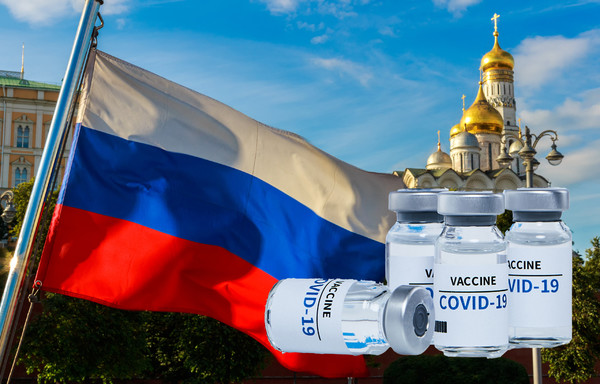The Korean government is reviewing the possibility of introducing the Russian Covid-19 vaccine Sputnik V, but only 7 percent of the Russian population received the vaccination, industry data showed.
Sputnik V, approved in Russia in August last year, was the first authorized Covid-19 vaccine globally. It is a virus vector vaccine, like those of AstraZeneca and Janssen, but uses different virus vectors in the first and second doses. Fifty-eight countries have approved Sputnik V.
Russia is one of only several developers of the Covid-19 vaccine, but its vaccination rate remains at low levels.

According to Our World in Data, an international statistics site, 10.34 million Russians, or 7 percent of the total population, received at least the first shot of the Covid-19 vaccine. Those who have received the second shot stood at 6.23 million, or 4.3 percent of the population.
In Russia, daily cases spiked to as many as 30,000 in December but have declined to around 8,000 in April.
Experts attribute Russia’s low rollout to the Russian public distrust and lack of production capacity.
Most Russian people remain wary of vaccination because they believe the Russian authorities poorly carried out safety verification during the Sputnik V review.
Sputnik V’s effect was officially recognized when its clinical trial results were published in The Lancet in February. In the study, the vaccine was 91.6 percent effective to prevent Covid-19.
On Monday, the Russian Direct Investment Fund (RDIF), Russia’s sovereign wealth fund, said Sputnik V was 97.6 percent effective in Russians who received the second dose of the vaccine.
BBC recently reported that Russian people were reluctant to get the Sputnik V vaccine because they were concerned about its safety. The report quoted a Russian citizen as saying that people were afraid because there were rumors about complications.
Lee Jae-gab, a professor of the Infectious Disease Department at Hallym University Kangnam Sacred Heart Hospital, said Russian people tend to avoid other vaccines. This tendency must have affected the rollout.
If the Korean authorities decide to introduce Sputnik V, they should prioritize verifying the vaccine’s safety, Lee emphasized.
On Friday, President Moon Jae-in ordered his aides to review the possibility of introducing new Covid-19 vaccines, including Sputnik V, news reports said.
The Ministry of Food and Drug Safety requested the Foreign Ministry to gather Sputnik V-related safety information from its diplomatic missions overseas.
“Even if Korea wants to use it as soon as possible, it has to deal with the reliability issue,” Lee said. “If local companies manufacture the Russian vaccine, the supply will not be a problem. But reliability is the real issue.”
Lee added that the ministry should conduct a thorough review of the Russian vaccine.
The ministry should receive sufficient data of Sputnik V, review it transparently, and disclose the results, Lee went on to say.
“It will be approved if it demonstrates clinical data that are similar to those of other vaccines. The government's evaluation is crucial.”

